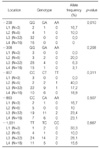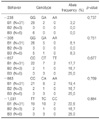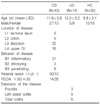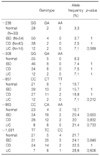Abstract
Purpose
The aim of this study was to investigate the existence of TNF-α polymorphisms in Korean children with Crohn's disease (CD), ulcerative colitis (UC), as compared to healthy controls.
Methods
Blood samples were obtained from 40 patients with CD, 14 patients with UC, and 30 healthy controls. Genotyping for 5 TNF-α polymorphisms (G238A, G308A, C857T, C863A, and T1031C) was performed. The allele frequencies for the inflammatory bowel diseases, CD and UC, were measured in patients with these disease and in healthy controls, and these allele frequencies were compared between the 3 groups. We examined the significant association between polymorphism and disease phenotype, such as location, behavior, perianal disease, and pediatric Crohn's activity index (PCDAI) in CD.
Results
Based on our findings, the TNF-α allele frequencies of G238A, G308A, C857T, C863A, and T1031C were 3.3, 8.3, 16.7, 16.7, 21.7% in healthy control, 2.5%, 7.5%, 18.8%, 20.0%, 22.5% in CD, 7.1%, 7.1%, 7.1%, 21.4%, 28.6% in UC. They were no statistically significant differences between the 3 groups. There were no associations between genotypes and phenotypes in CD, except a statistically significant higher allele frequency of G238A in ileal type (L1) disease (p=0.010).
Conclusion
Our results indicate that 5 TNF-α polymorphisms do not seem to be associated with susceptibility to inflammatory bowel disease in Korean pediatric patients even though young patients were anticipated to have a stronger genetic affiliation for these diseases than adult patients. We think that further studies are needed to find those genes associated with susceptibility to CD and UC in Korean pediatric patients with inflammatory bowel disease.
Figures and Tables
Table 4
Correlation Based on the Location and Genotype and Allele Frequencies of Polymorphism in the TNF-α Gene

Table 5
Correlation Based on the Behavior and Genotype and Allele Frequencies of Polymorphism in the TNF-α Gene

Table 6
Correlation Based on the Perinatal Lesion and Genotype and Allele Frequencies of Polymorphism in the TNF-α Gene

References
1. Kim BJ, Song SM, Kim KM, Lee YJ, Rhee KW, Jang JY, et al. Characteristics and trends in the incidence of inflammatory bowel disease in Korean children: a single-center experience. Dig Dis Sci. 2010. 55:1989–1995.

2. Song IS, Chang DK, Kim CY. Current status of Crohn's disease in Korea. Korean J Med. 1998. 55:158–168.

3. Dionne S, Hiscott J, D'Aqata I, Duhaime A, Seidman EG. Quantitative PCR analysis of TNF- alpha and IL-1 beta mRNA levels in pediatric IBD mucosal biopsies. Dig Dis Sci. 1997. 42:1557–1566.
4. Tysk C, Linberg E, Jarnerot G, Floderus-Myrhed B. Ulcerative colitis and Crohn's disease in an unselected population of monozygotic and dizygotic twins A study of heritability and the influence of smoking. Gut. 1988. 29:990–996.

5. Bousvaros A, Sylvester F, Kugathasan S, Szigethy E, Fiocchi C, Colletti R, et al. Challenges in pediatric inflammatory bowel disease. Inflamm Bowel Dis. 2006. 12:885–913.

6. Jang JY, Song SM, Kim KM, Oh SH, Lee YJ, Rhee KW. Lack of common NOD2 mutations in korean pediatric patients with inflammatory bowel disease. Pediatrics International. 2010. 52:888–889.

7. Camoglio L, Te Velde AA, Tigges AJ, Das PK, Van Deventer SJ. Altered expression of interferon- gamma and interleukin-4 in inflammatory bowel disease. Inflamm Bowel Dis. 1998. 4:285–290.

8. van Dullemen HM, van Deventer SJ, Hommes DW, Bijl HA, Jansen J, Tytgat GN, et al. Treatment of Crohn's disease with anti-tumor necrosis factor chimeric monoclonal antibody (cA2). Gastroenterology. 1995. 109:129–135.

9. Targan SR, Hanauer SB, van Deventer SJ, Mayer L, Present DH, Braakman T, et al. Crohn's Disease cA2 Study Group. A short-term study of chimeric monoclonal antibody cA2 to tumor necrosis factor alpha for Crohn's disease. N Engl J Med. 1997. 337:1029–1035.

10. Figueroa CC, Quera PR, Valenzuela EJ, Jensen BC. Inflammatory bowel disease: experience of two Chilean centers. Rev Med Chil. 2005. 133:1295–1304.
11. Sashio H, Tamura K, Ito R, Yamamoto Y, Bamba H, Kosaka T, et al. Polymorphisms of the TNF gene and the TNF receptor superfamily member 1B gene are associated with susceptibility to ulcerative colitis and Crohn's disease, respectively. Immunogenetics. 2002. 53:1020–1027.

12. Ceciliani F, Giordano A, Spagnolo V. The systemic reaction during inflammation: the acute-phase proteins. Protein Pept Lett. 2002. 9:211–223.

13. Söderholm JD, Streutker C, Yang PC, Paterson C, Singh PK, McKay DM, et al. Increased epithelial uptake of protein antigens in the ileum of Crohn's disease mediated by tumour necrosis factor alpha. Gut. 2004. 53:1817–1824.

14. Plevy SE, Landers CJ, Prehn J, Carramanzana NM, Deem RL, Shealy D, et al. A role for TNF-alpha and mucosal T helper-1 cytokines in the pathogenesis of Crohn's disease. J Immunol. 1997. 159:6276–6282.
15. Bouma G, Crusius JB, Oudkerk Pool M, Kolkman JJ, Von Blomberg BM, Kostense PJ, et al. Secretion of tumour necrosis factor alpha and lymphotoxin alpha in relation to polymorphisms in the TNF genes and HLA-DR alleles. Relevance for inflammatory bowel disease. Scand J Immunol. 1996. 43:456–463.

16. Bouma G, Xia B, Crusius JB, Bioque G, Koutroubakis I, von Blomberg BM, et al. Distribution of four polymorphisms in the tumour necrosis factor (TNF) genes in patients with inflammatory bowel disease (IBD). Clin Exp Immunol. 1996. 103:391–396.

17. Heresbach D, Ababou A, Bourienne A, Alizadeh M, Quelvennec E, Pagenault M, et al. Polymorphism of the microsatellites and tumor necrosis factor genes in chronic inflammatory bowel diseases. Gastroenterol Clin Biol. 1997. 21:555–561.
18. Sankaran D, Asderakis A, Ashraf S, Roberts IS, Short CD, Dyer PA, et al. Cytokine gene polymorphisms predict acute graft rejection following renal transplantation. Kidney Int. 1999. 56:281–288.

19. Turner D, Grant SC, Yonan N, Sheldon S, Dyer PA, Sinnott PJ, et al. Cytokine gene polymorphism and heart transplant rejection. Transplantation. 1997. 64:776–779.

20. Higuchi T, Seki N, Kamizono S, Yamada A, Kimura A, Kato H, et al. Polymorphism of the 5'-flanking region of the human tumor necrosis factor (TNF)-alpha gene in Japanese. Tissue Antigens. 1998. 51:605–612.

21. Kim TH, Kim BG, Shin HD, Kim JW, Kim CG, Kim JS, et al. Tumor necrosis factor-alpha and interleukin-10 gene polymorphisms in Korean patients with inflammatory bowel disease. Korean J Gastroenterol. 2003. 42:377–386.
22. van Hogezand RA, Verspaget HW. New therapies for inflammatory bowel disease: an update on chimeric anti-TNF alpha antibodies and IL-10 therapy. Scand J Gastroenterol Suppl. 1997. 223:105–107.
23. Mekinian A, Tamouza R, Pavy S, Gestermann N, Ittah M, Mariette X, et al. Functional study of TNF-α promoter polymorphisms: literature review and meta-analysis. European Cytokine Network. 2011. 22:88.

24. Sanchez R, Levy E, Costea F, Sinnett D. IL-10 and TNF-alpha promoter haplotypes are associated with childhood Crohn's disease location. World J Gastroenterol. 2009. 15:3776–3782.

25. IBD Working Group of the European Society for Paediatric Gastroenterology, Hepatology and Nutrition. Inflammatory bowel disease in children and adolescents: recommendations for diagnosis--the Porto criteria. J Pediatr Gastroenterol Nutr. 2005. 41:1–7.
26. Bousvaros A, Antonioli DA, Collettti RB, Dubinski MC, Glickman JN, Gold BD, et al. Differentiating ulcerative colitis from Crohn disease in children and young adults: report of a working group of the North American Society for Pediatric Gastroenterology, Hepatology, and Nutrition and the Crohn's and Colitis Foundation of America. J Pediatr Gastroenterol Nutr. 2007. 44:653–674.

27. Satsangi J, Silverberq MS, Vermeire S, Colombel JF. The Montreal classification of inflammatory bowel disease: controversies, consensus, and implications. Gut. 2006. 55:749–753.

28. Hyams JS, Ferry GD, Mandel FS, Gryboski JD, Kibort PM, Kirschner BS, et al. Development and validation of a pediatric Crohn's disease activity index. J Pediatr Gastroenterol Nutr. 1991. 12:439–447.

29. Wilson AG, Di Giovin FS, Blakemore AI, Duff GW. Single base polymorphism in the human tumour necrosis factor alpha (TNF alpha) gene detectable by NcoI restriction of PCR product. Hum Mol Genet. 1992. 1:353.

30. Purcell S, Neale B, Todd-Brown K, Thomas L, Ferreira MA, Bender D, et al. PLINK: a tool set for whole-genome association and population-based linkage analyses. Am J Hum Genet. 2007. 81:559–575.

31. Armstrong AM, Foulkes R, Jennings G, Gannon C, Kirk SJ, Gardiner KR. Tumour necrosis factor and inflammatory bowel disease. Br J Surg. 1997. 84:1051–1058.

32. Louis E, Franchimont D, Piron A, Gevaert Y, Schaaf-Lafontaine N, Roland S, et al. Tumour necrosis factor (TNF) gene polymorphism influences TNF-alpha production in lipopolysaccharide (LPS)-stimulated whole blood cell culture in healthy humans. Clin Exp Immunol. 1998. 113:401–406.

33. Wilson AG, Symons JA, McDowell TL, McDevitt HO, Duff GW. Effects of a polymorphism in the human tumor necrosis factor alpha promoter on transcriptional activation. Proc Natl Acad Sci USA. 1997. 94:3195–3199.

34. Yang SK, Lee SG, Cho YK, Lim J, Lee I, Song K. Association of TNF-alpha/LTA polymorphisms with Crohn's disease in Koreans. Cytokine. 2006. 35:13–20.

35. Koss K, Satsangi J, Fanning GC, Welsh KI, Jewell DP. Cytokine (TNF alpha, LT alpha and IL-10) polymorphisms in inflammatory bowel diseases and normal controls: differential effects on production and allele frequencies. Genes Immun. 2000. 1:185–190.

36. Sýkora J, Šubrt I, Dìdek P, Siala K, Schwarz J, Machalová V, et al. Cytokine tumor necrosis factor-alpha A promoter gene polymorphism at position -308 G-->A and pediatric inflammatory bowel disease: implications in ulcerative colitis and Crohn's disease. J Pediatr Gastroenterol Nutr. 2006. 42:479–487.




 PDF
PDF ePub
ePub Citation
Citation Print
Print







 XML Download
XML Download